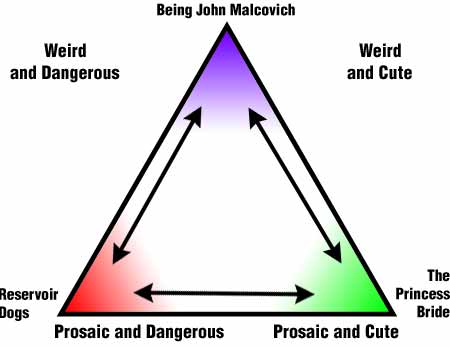For thousands of years, scholars, philosophers, artists, and religious teachers have struggled to understand the human condition. Elaborate theories, both moral and pragmatic, have been propounded to explain the bredth and diversiy of the human condition; everything from battling angels and demons to the hidden workings of the id and the superego have been believed to be responsible for the things we feel and the way we understand and interact with the world around us.
All of those ideas are wrong, as I realized while showering this morning. The human condition is varied but bounded, and it took Hollywood to give us a model that explains the diversity of the human experience while also showing us how it’s bounded.
All of life, you see, exists somewhere within the space delineated by the movies Reservoir Dogs, Being John Malcovich, and The Princess Bride.
Each of these three movies represents the extreme outer limit of one aspect of the human condition. All of humanity–all religion, all philosophy, all creation, all expression, all experience–falls somewhere within the space marked off by these three movies.
The human condition is not represented as a three-dimensional spece with each of these movies along one axis, because no part of the human condition can fall at the origin of such a space; that is, nothing within the human experience contains no relevance to any of these three movies. Instead, if some part of the human condition has very little, say, Reservoir Dogs in it, then it follows logically that it must therefore contain a great deal of Being John Malcovich, The Princess Bride, or both, as illustrated below:

